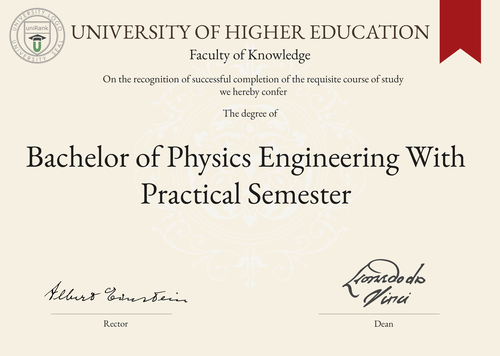
Bachelor of Physics Engineering with Practical Semester (B.Phys.Eng.)
Guide to Bachelor of Physics Engineering with Practical Semester Program/Course/Degree
Bachelor of Physics Engineering with Practical Semester (B.Phys.Eng.)

Program Name:
Bachelor of Physics Engineering With Practical SemesterProgram or Degree abbreviation:
B.Phys.Eng.Duration range:
The duration of the program typically ranges from 3 to 4 years.Tuition range:
The tuition fees for the program vary depending on the country and university, ranging from [insert range].Overview:
The Bachelor of Physics Engineering With Practical Semester program is designed to provide students with a strong foundation in physics principles and engineering concepts. It combines theoretical knowledge with practical applications, allowing students to develop problem-solving skills and hands-on experience in various areas of physics engineering.Curriculum Overview by year:
- Year 1: Introduction to Physics, Calculus, Mechanics, Thermodynamics - Year 2: Electromagnetism, Quantum Mechanics, Materials Science, Engineering Mathematics - Year 3: Optics, Solid State Physics, Fluid Mechanics, Engineering Design - Year 4: Specialization courses, Practical Semester, Final ProjectKey Components:
- Physics principles and theories - Engineering concepts and applications - Laboratory experiments and practical sessions - Problem-solving and critical thinking skills development - Specialization options in areas such as optics, materials science, or fluid mechanicsCareer Prospects:
Graduates of the Bachelor of Physics Engineering With Practical Semester program can pursue various career paths, including: - Research and development in industries such as aerospace, energy, or telecommunications - Engineering consulting firms - Government agencies and research institutions - Academia and teaching positionsSalary Expectations:
The salary expectations for graduates of this program can vary depending on factors such as the country, industry and level of experience. On average, physics engineers can expect a starting salary range of [insert range]. For a more accurate understanding of salary expectations, you can utilize the Job Sites Search Engine, from our sister site jobRank, which searches over 4,600 job sites worldwide. Make sure to specify not only the job title but also the country you are interested in.Conclusions:
It is important to note that the duration, tuition fees, curriculum, key components, career prospects and salary expectations of the Bachelor of Physics Engineering With Practical Semester program can vary: a) by the chosen country or location where to study the program b) by the chosen university where to study the program Visitors interested in pursuing this specific degree can use the uniRank World Universities Search Engine to find universities offering the program anywhere in the world.World Universities Search Engine
search for Bachelor of Physics Engineering with Practical Semester (B.Phys.Eng.) and add the Location (country, state etc.) or specific University you are interested in studying at.
Query examples:
- Bachelor of Physics Engineering with Practical Semester (B.Phys.Eng.) United States
- Bachelor of Physics Engineering with Practical Semester (B.Phys.Eng.) United Kingdom online
- Bachelor of Physics Engineering with Practical Semester (B.Phys.Eng.) Australia international students
- Bachelor of Physics Engineering with Practical Semester (B.Phys.Eng.) University of California
- Bachelor of Physics Engineering with Practical Semester (B.Phys.Eng.) University of London tuition fees
- Bachelor of Physics Engineering with Practical Semester (B.Phys.Eng.) University of Sydney scholarships
Share Program/Course
Interesting? Share this program/course/degree info with your friends now.